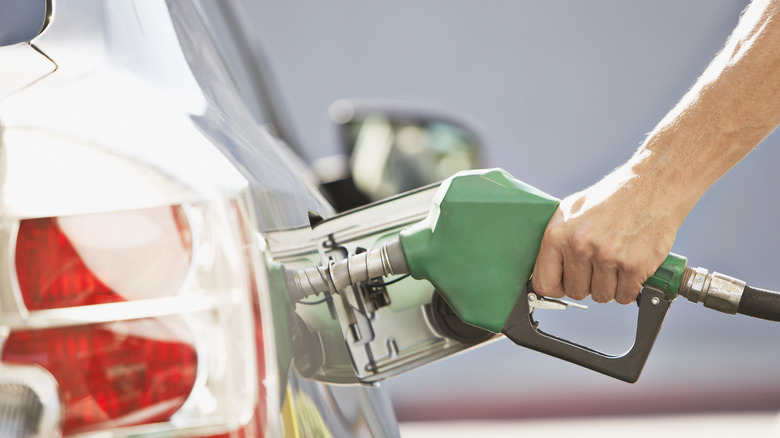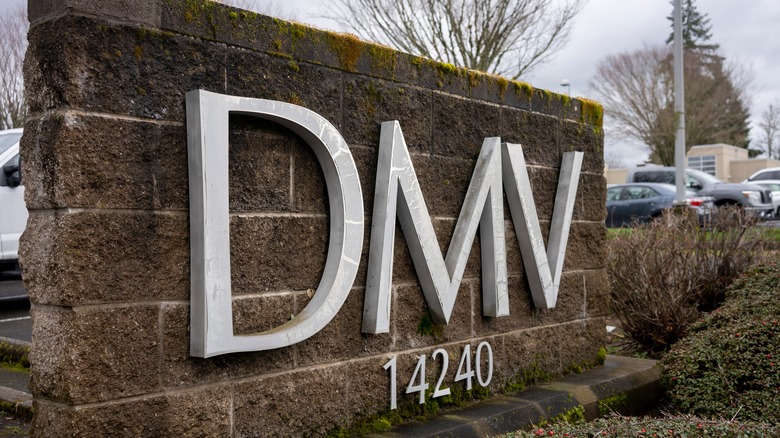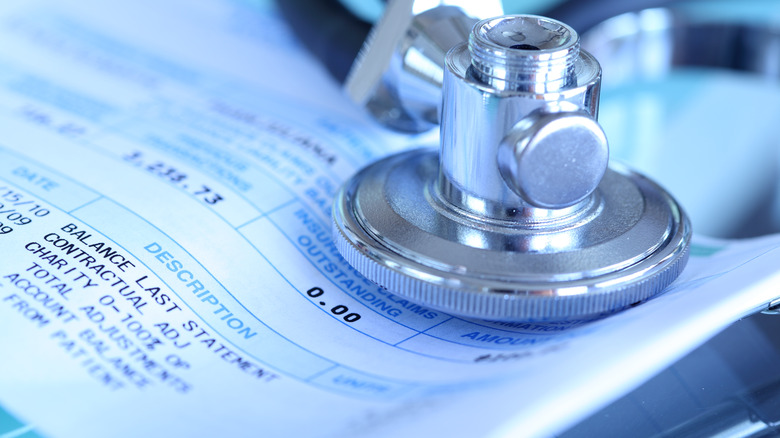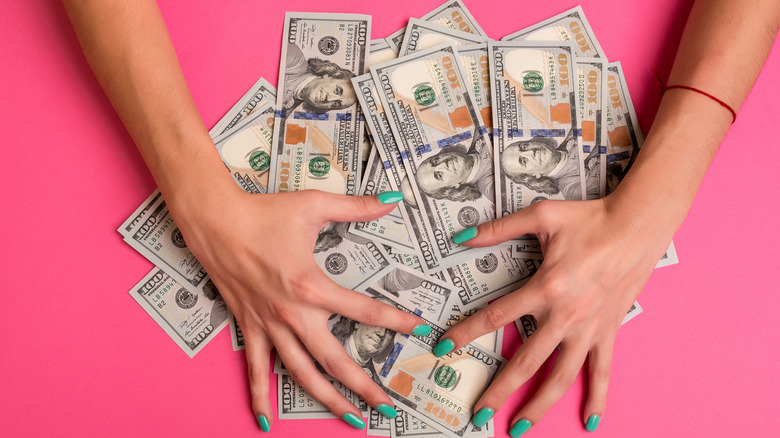Things You Should Never Pay For With A Credit Card
Credit cards can be a wonderful financial resource. As a backstop for financial emergencies, responsible utilization is a great way to build excellent credit, but credit can also be the bane of a consumer's existence. Mismanagement not only can bring in additional charges and a more top-heavy budget, but lengthy repayment schedules can extend out financial uncertainty indefinitely. There are plenty of things you should always use a credit card to purchase — like car rentals and concert tickets — but there's an equally long list of no-gos when considering payment options for spending needs.
Using a credit card to fund certain kinds of expenses can leave you vulnerable to many additional problem spots. Payments for some large purchases may open your finances up to ongoing havoc in the form of running interest additions that balloon the original expense's price tag. Others still can allow you to fall down a slippery slope of overspending that ultimately erodes financial stability without raising the standard alarm bells within your budgetary math. Keeping the following expenses outside of your credit card strategy can be a valuable means of reducing your dependence on lending products and minimize their costs overall.
Paying off a loan with your credit
In almost all circumstances, paying off another lending product with your credit card is a terrible idea. There are some very unique times when this might make sense, but they will be few and far between. The issue here is that credit cards come with a much higher interest rate than virtually any other type of borrowing you'll find in the marketplace. Likewise, a credit card offers a revolving line of credit rather than a set repayment term. This means that there is only a minimum payment you must make on any credit card balance and all remaining balances from month to month accrue interest on an ongoing basis. There is no definite end date when repaying credit card debts and the cost of managing revolving debt on your credit card is significantly higher than anywhere else.
However, even though you're unlikely to ever experience favorable conditions using a credit card in this manner, there are some opportunities that may prove valuable. An elongated zero interest repayment period coupled with a lone debt burden (just this single loan and no or very few other monthly expenses) coalesce to provide a favorable repayment opportunity. If you are absolutely sure that you can pay off the entire balance before the zero interest term expires then moving a debt to a card drastically reduces or even perhaps eliminates additional costs from the repayment calculation. Unfortunately, this is a very big "if."
Your tax bill
It's possible to pay your tax bill with a credit card, but doing this will bring about additional fees in most instances, raising the total cost that you have to pay to the government by a notable margin. Everything about tax preparation revolves around intelligent planning and the minimization of additional payments. Remember, you've already paid your taxes if you work in a standard employment relationship, and with the standard deduction and other potential tax breaks factored in it's likely that the government owes you money. Of course, everyone's circumstances will be their own and plenty of taxpayers still owe the IRS come tax time.
If you do owe additional tax money, there are lots of payment plan options available, especially for anyone far behind on the total they'll need to make up. For self-employed individuals or those who earned a significant profit in the stock market or elsewhere — and therefore may not have paid most or all of their taxes in monthly, paycheck-format installments — these are the best approaches to managing this burden. Paying a tax bill with your credit card often results in tacked on fees, but the added cost upfront isn't the primary issue for most taxpayers. Once again, the interest rate associated with leaving a balance from month to month is the real killer. Avoiding a revolving balance should be every credit card user's first priority when planning their finances, and a tax payment flies in the face of this goal.
Gas (when cash offers are in play)
Many credit cards that come with rewards points and cash back offers incentivize customers to consider using these products for a variety of spending categories, with fuel represented prominently among them. These bonus reward incentives make credit card usage at the pump an enticing offer that many drivers feel they can't ignore.
But gas is something that benefits from a different kind of discount when you forego the use of your credit card. Many gas stations across the country offer two separate price structures for the cost of fuel. You'll often find a much lower cost when paying in cash versus swiping your card at the pump or inside at the register. Gas stations have been known to drop prices by as much as 10 cents or more per gallon with a cash price discount. The result is a total transactional cost that rivals or betters the credit card price plus incentives. The next time you're at the pump consider spending a few extra seconds to calculate this difference in cost between the card price minus its cash back value against the direct savings you receive from pulling bills out of your wallet instead.
Purchases at the DMV and other government offices
Another potentially surprising transaction that shouldn't be made with the credit card is one located in any type of government services building. In the same way that added fees are assessed on tax payments conducted via your credit card, the federal government adds on service fees for card usage in many of its physical offices, too. This might come as a surprise, especially considering legislation surrounding a specific consumer protection against this kind of "payment discrimination."
Federal regulations do indeed prohibit merchants from tacking on credit card fees that increase the cost to consumers while offsetting their own processing costs. However, this protection doesn't extend to the government's own services, and so as an exempt merchant you should expect to see this added charge that increases the total price. It might not be all that surprising, then, to learn that many of the payments you might make at the DMV or in any municipal services office in your town will be best handled with a debit card or cash.
Mortgage payments
Mortgage payments are a gray area when it comes to using a credit card. Mortgage providers don't typically allow for payment directly from a credit account, but there are third-party services that will allow you to get around these functional restrictions if the desire is really there for you. The prohibition isn't likely to be built into the terms of the contract, but rather exist as a functional hurdle in which a bank simply won't accept this card type when making a direct contribution — much like services such as Wise or Revolut won't generally allow for cash deposits to be made from a credit card.
The problems inherent to paying your mortgage with a credit card extend beyond the logistical difficulties, however. As is the case with many payments and lending products, credit cards carry an interest rate that far exceeds the additional costs built into your mortgage. As you pay the bank back for financing your home, you're building equity in the asset. While not necessarily working against your "ownership position," transferring this debt from mortgage loan with low interest to a credit card bill that suffers from enormous APR figures is a great way to take more water on board rather than continue reducing your debt burden. You'll still have to pay off this value but it now exists in the universe with a far greater cost in terms of interest, alongside an open ended balance rather than a set payoff timeline.
College tuition
A large expense like college tuition can be difficult or impossible to pay off before interest costs catch up to your balance. Of course, there may be a unique circumstance in which this approach might make sense as a fiscal solution. However, credit card usage here is generally not going to be the right financial decision for most people. Paying a college tuition bill with your credit card might be useful for building reward points or cash back, but this is only a viable strategy if you already have the capital set aside and simply want to funnel the payment through your credit card account rather than using it as a front line payment method without concrete plans to eliminate the debt.
Likewise, collegiate institutions tend to offer a wide range of alternative payment methods beyond direct personal payment of tuition bills. Generally speaking, students will be eligible for federal funding when attending university programs, and private educational loans exist in marketplace as well. If you're planning on borrowing money to pay for your education one of these avenues is going to be a much more cost effective solution than pulling out your credit card under virtually every circumstance imaginable. A shift in thinking about strategies for paying off federal student loans has begun to take root with the help of income-driven repayment programs and other changes in federal management strategy. This makes them even more valuable to current students and those thinking of returning to the classroom.
Medical bills
Much like college expenses, moving a substantial medical bill onto a credit card makes it subject to blisteringly high interest rates. Once again, without a concrete strategy for eliminating the debt completely or utilizing a zero interest repayment term to chip away at it over the course of a pre-planned period of time, you'll simply be piling on to the debt every month with significant interest adjustments that exponentially increase the cost of your procedure or medication.
Much like taxes, educational expenses, and other potentially large payment obligations, medical bills can often be broken down into manageable payment plans. Instead of simply reaching into your wallet when the bill comes, it's a good idea to speak with your medical provider in order to understand the entire kaleidoscope of options you have at your disposal. Hospitals and doctor's offices obviously want to get paid for the services they provide but there is also a realistic understanding by those in the medical profession that payment isn't always going to be straightforward and simple, especially when the bill comes out to a sizable amount. Your first step when facing a large medical expense is always going to be with your insurance provider. You may be able to sidestep most or all of the expense with the help of your insurance coverage — that's what it's there for, after all. However, if you find yourself still in the hole, discussing payment plan options can help shift this obligation into bite sized chunks.
Any large purchase that brings you near your credit limit
Large purchases aren't necessarily an issue for credit card users. Many credit card users save up for big purchases like a new TV or a family vacation in the weeks or months leading up to the expense. Then, they charge the purchase to their credit card in order to take advantage of built-in insurance protections and rewards point opportunities. The funding that had been saved up is then used to pay off the transaction straight away in order to enjoy all of the benefits without suffering from the consequences of carrying high-interest debt.
This approach fits neatly within responsible borrowing practices. The trouble begins to take root when these additional planning steps don't factor into this swipe of a credit card. Making a big purchase without a plan to pay it back places you in a vulnerable position. The trouble begins to compound when that expense brings you close to or all the way up against your credit limit. Not only will you have to contend with a lack of repayment planning, but building up your balance like this also impacts your credit score in a pointed and negative way. If your utilization rate jumps significantly you'll almost certainly see a notable decline in your credit score over the following months. It signifies a lack of responsible financial planning and can impact your ability to borrow in the near- to medium-term.
Small impulse purchases (in large volumes)
On the flip side, people can alternatively fall victim to a different kind of spending issue. Instead of paying for large purchases without a plan for definitive repayment, many people pull out their credit card for most or all of their everyday spending needs. The idea here is that they can then take full advantage of reward opportunities with every transaction, but constantly using a credit card for small- or medium-sized purchases can begin to add up drastically.
When making small purchases from your debit account, you'll see the available balance dwindle down at a steady pace, keeping you abreast of how much money you have left to spend. But when building up the bill instead, many people have a tendency to overestimate their ability to repay debt in the following billing cycle. Even more problematic, some people don't keep a constant eye on their credit card account and can end up far exceeding their budget allocation for routine spending needs. With each small purchase, you commit yourself to paying back a lender rather than simply using up some of your available capital. For those who aren't diligent with their account management practices, this can build into a bit of a crisis when it comes time to repay all that added up spending.
Online betting
There are a rake of reasons that make online betting with a credit card a complete no-go. In the same way what tiny purchases can add up to a far greater number than a consumer might anticipate, utilizing your credit card account to support a gambling habit can easily spiral into a far greater expense than you can manage. Some people gamble recreationally and like to put small bets on sporting events they are actively watching. This can create a built in "dog in the fight," so to speak, and establish a unique emotional attachment to the event. There's nothing inherently wrong with gambling, but many people find that a few wins here and there can spark a uniquely potent addiction to the activity. Gambling can quickly transition from a hobby to a need that is impossible to completely satiate. Therefore, funding a gambling hobby (or addiction, if it's become that) with a credit card can prove to be a dangerous decision that places you in extreme financial jeopardy.
Another issue that comes into play with online betting is the tendency for these purchases to be charged on your credit card account as a cash advance rather than a straightforward sale of good or services. Many credit card companies assess a different and often much higher interest rate to cash advance transactions, compounding the expense of this hobby in a new and incredibly costly way.
Cash advances in most instances
The most egregious use of credit lines is the cash advance. Cash advances are added to your account on a separate interest-bearing line, and therefore may be dealt with differently when you make your monthly payments. It's entirely possible that your credit card company will apply payment funding to balances with the highest interest assessment first and then move on from there, but it isn't a universal practice and card issuers often have the leeway to credit your account in any format that they wish. This means that your cash advance balance might be paid down first, or it might be shoved to the end of the line. Your cardholder agreement should shed light on this hierarchy.
The primary issue with cash advances is the interest rate. These transactions are easy to make, with many card issuers even allowing for a deposit straight into your bank account rather than requiring you to access an ATM to withdraw funds. However, paying off a cash advance balance is difficult because these actions come with interest charges that overshadow even the already excessive purchasing APR that dominates your credit card account. As with many financial tools, there are exceptions to the rule. You may find an introductory APR for cash advance offers that help you pay off other credit card balances. As long as you have a plan to tackle the debt before it reverts to its standard rate, these kinds of offers might make sense.











